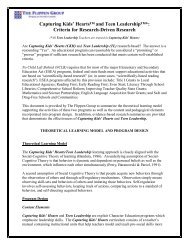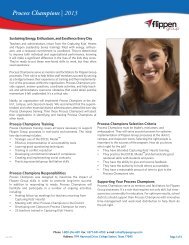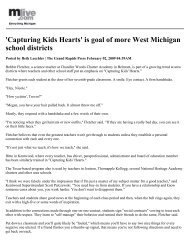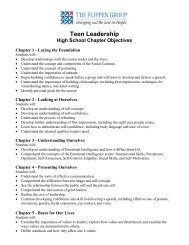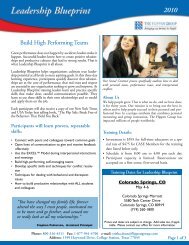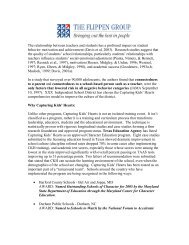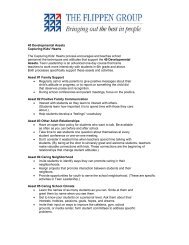Smart & Good High Schools - The Flippen Group
Smart & Good High Schools - The Flippen Group
Smart & Good High Schools - The Flippen Group
- No tags were found...
Create successful ePaper yourself
Turn your PDF publications into a flip-book with our unique Google optimized e-Paper software.
CHAPTER 5: Fostering the 8 Strengths of Character—Outcome 3<strong>High</strong> school students don’t always have the greatest manners,but schools could help by teaching classes that simulatehow it is in the business world. In school, if you’re rudeto the teacher, the punishment is likely to be minimal.When you have a job, if you aren’t respectful, there’s agood chance you will no longer be working there.“In the real world, being rude cancost you your job.”Opinion polls reveal that large numbers of people, youngand old, are distressed by the lack of manners theyencounter in everyday life. 23 Books such as Restoring SchoolCivility by Philip Fitch Vincent and David Waangard speakto the need to pay more attention in our schools and familiesto the teaching of basic courtesy. 24A Lesson on MannersMany teachers would like to address theissue of manners but aren’t sure how todo it without coming across as“preachy.” We interviewed a high school teacher, troubledby what he saw as a general decline in manners, who hadworked out a way to approach this issue that did not talkdown to students but rather respected their ability to givethe subject serious thought.He raised the issue of manners on the first day of the newschool year and began by making two points:In my experience, most people are capable of courtesy whenthey know clearly what is expected of them.<strong>The</strong> classroom is a more positive place when everyone treatseveryone else with courtesy and consideration.He then distributed a handout titled, “Whatever Happenedto <strong>Good</strong> Manners?” At the top was a quote fromGeorge Bernard Shaw, “Without good manners, humansociety becomes intolerable.”After sharing some of his own perceptions on the state ofmanners, he asked students to consider several questionslisted on the handout:If manners are declining, why do you think that is happening?Why is society better when people treat each other withrespect?Why is a classroom better when both students and teachershow mutual respect?Manners are moreimportant than laws.Why does Henry Rogers say, “<strong>Good</strong> manners are one ofthe most important keys to success in life”?What is the “Golden Rule”? If it’s so simple, why do morepeople today have difficulty practicing it?Which impresses people more—being “cool” or beingcourteous?His instructions to the class:Please take out a sheet of paper and answer these questions.Don’t sign your name. I’ll collect your papers andread them aloud to the class.He then collected students’ written responses, read themaloud, and used them as a springboard for a discussion ofmanners. This took the rest of the period. He comments:This activity made a noticeable differencein students’ behavior. In the weeks thatfollowed, several told me they wished theirother teachers would discuss good manners.An exchange student from Germanytold me, “I enjoy your class not justbecause I’m learning a lot of Americanhistory but also because of how polite everyone is.” At theend of the semester another boy said: “That manners pageyou handed out really made me think. Sometimes we dorude things and aren’t even aware that we’re being rude.”—EDMUND BURKE“Why does Henry Rogers say, ‘<strong>Good</strong>manners are one of the mostimportant keys to success?’”What were the features of this lesson that made it aneffective character education experience for these highschool students?✔ <strong>The</strong> teacher taught the lesson on the first day. Studentscould reflect on manners without feeling defensive.This proactive approach illustrates one of the hallmarksof effective character education: It teacheswhat’s right before something goes wrong.✔ He took a whole class period to discuss good manners.That sent an unmistakable message: Manners matter.✔ He exercised directive leadership. He didn’t ask students,“How many people think manners are important?”Rather, he designed the whole structure of thelesson around the fact that manners are important inschool and life.✔ He started positively by stating his belief that most peo-124<strong>Smart</strong> & <strong>Good</strong> <strong>High</strong> <strong>Schools</strong>




